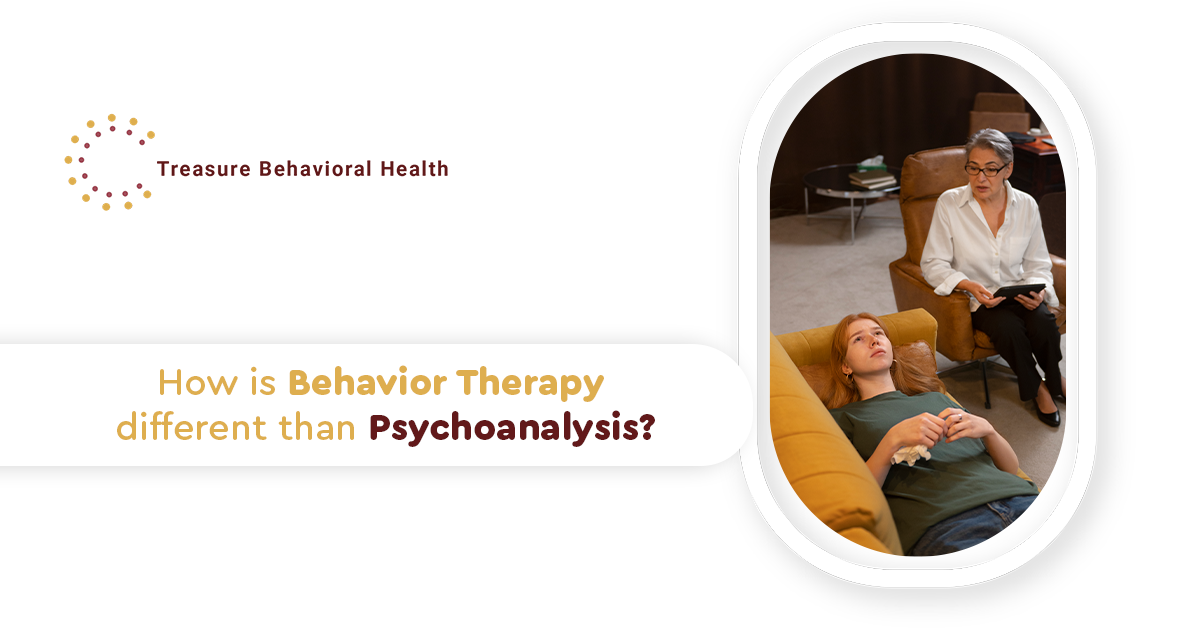Two main therapy types exist: behavior therapy and psychoanalysis. These are the ones people usually hear about in therapy discussions. Both are used to help people be happier and solve issues, but how is behavior therapy different than psychoanalysis? We will explore different therapies, their purposes, and differences. This helps you pick the best option for yourself.
Interested in how behavior therapy and psychoanalysis differ? Treasure Behavioral Health offers customized care to improve your mental health. Contact us today!
What Is Behavior Therapy?
Behavior therapy is all about reshaping the troublesome actions in our lives. The concept is clear: tweak your behavior, and watch your feelings shift. This therapy focuses on the present. It’s an active method for reaching emotional wellness.
How Behavior Therapy Helps
- Works on Current Problems: It focuses on the present, not the past.
- Clear Goals: Therapists and clients set clear targets. They help with stress, sleep, and anger.
- Step-by-Step Approach: Therapists split problems into smaller, easier pieces, solving them step-by-step.
For example, if public speaking makes you anxious, a therapist can help. Start by talking with one person. Then, move to a small group. Eventually face a larger audience with confidence.
What Is Psychoanalysis?
Psychoanalysis, developed by Freud, uncovers hidden emotions and thoughts. It uncovers past difficulties. A “psychoanalytic behavior” believes that unperceived emotions drive our actions today.
How Psychoanalysis Helps
- Explore Your History: This therapy looks at childhood to find the roots of current issues.
- Uncovers Unconscious Thoughts: Therapists analyze your dreams and your clever slips of the tongue.
- Takes Time: This process takes time, requiring commitment to deep exploration. Months, sometimes years, of sessions lead to profound insights.
For example, when anger arises, a psychoanalyst might journey into your past. They will seek out early memories that sparked feelings of powerlessness or pain.
How Is Behavior Therapy Different From Psychoanalysis?
The main difference is their focus. Behavior therapy targets present issues, aiming to fix what is broken now. Meanwhile, psychoanalysis explores the past, seeking to uncover hidden feelings. This contrast fuels the debate: “psychotherapy vs psychoanalysis.”
Key Differences
- Focus on Time: Behavior therapy looks at the present while psychoanalysis focuses on the past, and both approaches can be supported through convenient virtual therapy sessions.
- Duration: Behavior therapy is often shorter, lasting weeks or months. Psychoanalysis takes longer, sometimes years.
- Method: Behavior therapy uses tools and exercises to change actions. Psychoanalysis uses conversations to explore deep feelings.
- Goals: Behavior therapy aims to solve immediate problems. Psychoanalysis looks to understand the “why” behind those problems.
Why Do People Choose Behavior Therapy?
Many people like behavior therapy because it is practical and works quickly. It’s a popular choice for these reasons:
- Quick Results: You don’t need to spend years in therapy to see improvements.
- Simple Tools: You learn easy-to-follow techniques, like breathing exercises or changing negative thoughts.
- Think About Doing: It’s about acting, not just speaking.
Behavior therapy helps with anxiety, phobias, and bad habits.
Why Do People Choose Psychoanalysis?
Others prefer psychoanalysis because it goes deeper and offers long-term understanding. Some reasons people pick this therapy are:
- Dealing with Complex Emotions: It helps to reveal difficult emotions.
- Understanding the Past: It shows how childhood experiences still affect us today.
- Fostering Self-Awareness: It builds a lasting understanding of who we are inside.
Psychoanalysis is key to healing. It addresses trauma and improves relationships. This method helps you explore your mind, leading to growth and better connections.
Behavior Therapy and Psychoanalysis Together
In certain situations, therapists choose to blend both methods seamlessly. This is an integrative approach. For instance, they may harness behavior therapy to tackle everyday stress. Meanwhile, they explore the past with psychoanalytic tools, offering deeper layers of healing.
Psychoanalyst vs Therapist: What’s the Difference?
- A psychoanalyst explores your unconscious mind. They explore your past, unearthing hidden treasures of thought and feeling.
- In contrast, a therapist, especially a behavior therapist, zeros in on actions and present emotions.
When deciding between psychotherapy and behavioral therapy, consider your goals: quick fixes or profound insights.
Which Therapy Is Right for You?
Your choice is based on your circumstances and goals.
Choose Behavior Therapy if:
- You need quick, actionable help.
- You’re working on specific problems, like anxiety or bad habits.
- You want to see improvements in a few weeks or months.
Choose Psychoanalysis if:
- You want to understand your deeper feelings.
- You are always inquisitive about how your past influences the way you are now.
- You will be open to taking more time for therapy to make sure of the long-term advantages.
Remember, neither is better nor worse; it’s about what works best for you.
Myths about Therapy
There are a few misunderstandings about behaviorism vs psychoanalysis:
“Behavior therapy is too basic.”
- Not true! Behavior therapy tackles tough problems like PTSD or severe anxiety.
“Psychoanalysis is outdated.”
- While not as common, it still helps many people uncover deep issues.
“Therapy is only for people with big problems.”
- Therapy suits anyone wishing to better their mental health, no matter whether the problem feels small or huge.
Conclusion: How Is Behavior Therapy Different Than Psychoanalysis?
What makes behavior therapy different from psychoanalysis? Behavior therapy is quick, focusing on the present and lifting mood. Psychoanalysis, however, dives into the past to uncover hidden feelings.
Both therapies can be life-changing. Behavior therapy is best for quick relief from specific issues. Psychoanalysis suits those who are curious about their emotions and are ready to explore.
Choosing a path? Just start. Each journey is unique. Both therapies offer valuable tools for happiness.
FAQs
Which therapy works better for anxiety?
Behavior therapy is often recommended for anxiety because it provides practical tools to manage it quickly.
What is psychoanalytic behavior?
Psychoanalytic behavior refers to how hidden, unconscious feelings influence actions. Psychoanalysis helps uncover and understand these feelings.


No comment